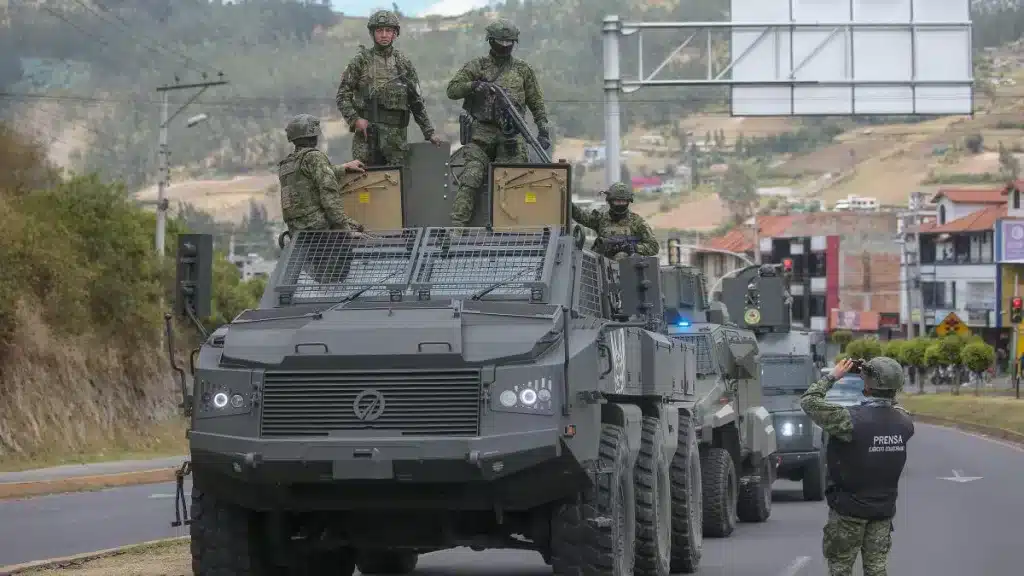
Heavy military deployment, as seen in the streets of Ecuador. A military convoy on the streets of Otavalo, Imbabura province. Photo: EFE.

Orinoco Tribune – News and opinion pieces about Venezuela and beyond
From Venezuela and made by Venezuelan Chavistas

Heavy military deployment, as seen in the streets of Ecuador. A military convoy on the streets of Otavalo, Imbabura province. Photo: EFE.
The social crisis in Ecuador escalated dramatically this Sunday with the confirmation of the death of an Indigenous protester from a gunshot wound in the province of Imbabura, amid week-long anti-government protests.
The Regional Foundation for Human Rights Advice (Inredh) denounced the death of Efraín Fueres, an Indigenous community member who died in a hospital after being injured in Cotacachi. The organization categorically rejected the lethal and unlawful use of force and demanded an immediate investigation to determine responsibility for the crime.
The Foundation’s complaint comes amid reports of intense military and police repression in rural areas. The Confederation of Indigenous Nationalities of Ecuador (CONAIE), which is maintaining the call for a national strike, reported that during the night and early morning, a security convoy entered communities such as Ilumán and Cotacachi, using tear gas and live ammunition. Additionally, one more person remains in serious condition due to the violence, according to INREDH.
🚨 ALERTA URGENTE | En Cotacachi, Efraín Fueres, comunero indígena, falleció tras recibir un impacto de bala por parte de las Fuerzas Armadas.
Desde INREDH rechazamos la represión y exigimos una investigación inmediata que garantice verdad y justicia para las víctimas y sus… pic.twitter.com/dNEpa2r6dw
— INREDH (@inredh1) September 28, 2025
The serious violence generated a wave of international warnings against the government of Daniel Noboa. Gina Romero, UN Special Rapporteur on the Right to Freedom of Peaceful Assembly, expressed her deep concern. She denounced that the Ecuadorian government “seems to have launched a persecution against civil society,” warning of the excessive use of force and arbitrary arrests of protesters.
The UN’s condemnation extended to the demobilization tactics employed by the government. Romero described the freezing of bank accounts of Indigenous leaders as “harassment not aligned with international standards.” Joining the condemnation, the UN Permanent Forum on Indigenous Issues also urged Noboa to guarantee freedom of expression, the right to peaceful assembly, and due process for the 100 detainees who, according to official figures, remain in custody.
For his part, President Noboa maintains an unwavering stance, reiterating in an interview with Ecuavisa that “the police and the army will be responsible for restoring order.” The president justified the repression by asserting that the protest had ceased to be a social protest, arguing that intelligence reports link the demonstrators to illegal mining, organized crime, and even the presence of members of the transnational criminal group “Tren de Aragua.”
Ecuador Faces Second Prison Massacre in a Week: 17 Dead in Esmeraldas
As the humanitarian crisis deepens with the first death of the conflict, the National Association of Flower Producers and Exporters (Expoflores) reported economic losses amounting to nearly $1 million a day due to roadblocks and attacks on farms in Imbabura. The death of Indigenous community member Efraín Fueres intensifies the need for a transparent investigation and puts more international pressure on the Noboa government, whose refusal to repeal the diesel subsidy remains the central driver of the mobilization.
This Sunday, the National Labor Organization (CONAIE) reaffirmed the continuation of the national strike, which has now lasted seven days, firmly demanding that President Daniel Noboa repeal Decree 126, which eliminated the diesel subsidy.
(Telesur)
Translation: Orinoco Tribune
OT/JRE/SA